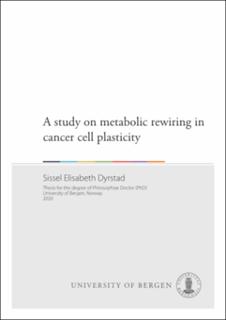| dc.contributor.author | Dyrstad, Sissel Elisabeth | en_US |
| dc.date.accessioned | 2020-08-17T07:57:50Z | |
| dc.date.available | 2020-08-17T07:57:50Z | |
| dc.date.issued | 2020-08-21 | |
| dc.date.submitted | 2020-08-05T07:46:44.235Z | |
| dc.identifier | container/98/63/8f/b2/98638fb2-9178-4ff8-9a91-9b599a10c0bf | |
| dc.identifier.isbn | 9788230869673 | en_US |
| dc.identifier.isbn | 9788230864746 | en_US |
| dc.identifier.uri | https://hdl.handle.net/1956/23802 | |
| dc.description.abstract | Adaptation of cellular energetics is an important feature of tumorigenesis as a vast supply of nutrients is needed to accommodate increased growth. Essential energy pathways includes glucose, fatty acid and amino acid metabolism, where mitochondria function as key orchestrators. The main aim of this thesis was to investigate metabolic rewiring during cancer cell plasticity. Providing knowledge on central metabolic regulators and markers of metabolic reprogramming may present new therapeutic strategies to overcome development of resistance to cancer therapy. In order to identify metabolic rewiring associated with cancer cell plasticity we focused especially on cellular energetics in epithelial to mesenchymal transition (EMT) and drug resistance, which are both well-documented examples of cancer cell plasticity. EMT is important in cellular functions such as wound healing and embryonal development. However, this process is hijacked in cancer development and is known to be an important mediator of invasion and metastasis, and associated with poor overall survival. We found that altered mitochondrial function contributed to development of EMT in breast cancer. This included reduced mitochondrial size and network, and reduced mitochondrial Complex II succinate dehydrogenase (SDH) activity, which resulted in reduced mitochondrial respiration. Upon analyzing gene expression data in breast tumors, we found the SDH subunit C and EMT to be inversely correlated, especially in basal-like breast cancer. Upon investigating markers of altered response to starvation and fatty acid oxidation, we found pyruvate dehydrogenase kinase 4 (PDK4), a central regulator of pyruvate metabolism, to be upregulated. We found that PDK4 was a sensitive hallmark of cellular plasticity as upregulation of PDK4 marked the metabolic shift from glucose to fatty acid oxidation (FAO). This was evident both upon overexpression of central FAO regulators and pharmacological FAO inducers. Altered PDK expression was also evident in non-small cell lung cancer (NSCLC), with PDK1 being upregulated in tissue from NSCLC patients compared to healthy tissue. Acquired drug resistance to epidermal growth factor receptor tyrosine kinase inhibitors (EGFR TKIs) in NSCLC remain one of the major contributors to the high mortality rate of lung cancer, and is an example of cancer cell plasticity. Therefore, we developed cell lines resistant EGFR TKIs to mimic acquired drug resistance. We also found evidence of deregulated pyruvate metabolism upon drug resistance through upregulation of PDK2. As PDKs was identified as a common denominator both in NSCLC patient cohorts and upon acquired drug resistance, we tested the sensitivity and effect of the PDK inhibitor dichloroacetate (DCA) with the aim to increase therapeutic efficacy. Upon DCA treatment, we found increased pyruvate and lactate oxidation, while reducing glucose oxidation and lactate production. We further found that DCA reduced growth alone or in synergy with EGFR TKIs in both sensitive and resistant cell lines. To conclude, we show that metabolic rewiring is an important feature of cancer cell plasticity, both through dysregulation of mitochondrial function and altered pyruvate metabolism. We found that metabolic rewiring mediates the process of EMT and drug resistance. Rewiring of cellular energetics is a common feature in cancer cell plasticity, and we show that inducing metabolic stress through targeting pyruvate metabolism, may represent a promising therapeutic strategy. | en_US |
| dc.language.iso | eng | eng |
| dc.publisher | The University of Bergen | eng |
| dc.relation.haspart | Paper I: Røsland, G. V., S. E. Dyrstad, D. Tusubira, R. Helwa, T. Z. Tan, M. L. Lotsberg, I. K. N. Pettersen, A. Berg, C. Kindt, F. Hoel, K. Jacobsen, A. J. Arason, A. S. T. Engelsen, H. J. Ditzel, P. E. Lønning, C. Krakstad, J. P. Thiery, J. B. Lorens, S. Knappskog and K. J. Tronstad (2019). "Epithelial to mesenchymal transition (EMT) is associated with attenuation of succinate dehydrogenase (SDH) in breast cancer through reduced expression of SDHC." Cancer & Metabolism 7(1): 6. The article is available at: <a href="http://hdl.handle.net/1956/23463" target="blank">http://hdl.handle.net/1956/23463</a> | en_US |
| dc.relation.haspart | Paper II: Pettersen, I. K. N., D. Tusubira, H. Ashrafi, S. E. Dyrstad, L. Hansen, X.-Z. Liu, L. I. H. Nilsson, N. G. Løvsletten, K. Berge, H. Wergedahl, B. Bjørndal, Ø. Fluge, O. Bruland, A. C. Rustan, N. Halberg, G. V. Røsland, R. K. Berge and K. J. Tronstad (2019). "Upregulated PDK4 expression is a sensitive marker of increased fatty acid oxidation." Mitochondrion 49: 97-110. The article is available at: <a href="http://hdl.handle.net/1956/21104" target="blank">http://hdl.handle.net/1956/21104</a> | en_US |
| dc.relation.haspart | Paper III: Dyrstad S. E., M. L. Lotsberg, T. Z. Tan, S. Hjellbrekke, I.K.N Pettersen, D. Tusubira., A. S. T. Engelsen, T. Daubon, A. Mourier, O. Dahl, J. P. Thiery, J. Lorens, K. J. Tronstad and G.V. Røsland “Inhibition of pyruvate dehydrogenase kinase redirects NSCLC cell metabolism and counteracts development of resistance to epidermal growth factor receptor tyrosine kinase inhibitors“. The article is not available in BORA. | en_US |
| dc.rights | In copyright | eng |
| dc.rights.uri | http://rightsstatements.org/page/InC/1.0/ | eng |
| dc.title | A study on metabolic rewiring in cancer cell plasticity | en_US |
| dc.type | Doctoral thesis | |
| dc.date.updated | 2020-08-05T07:46:44.235Z | |
| dc.rights.holder | Copyright the Author. All rights reserved | |
| dc.contributor.orcid | https://orcid.org/0000-0002-7033-3519 | |
| fs.unitcode | 13-14-0 | |
